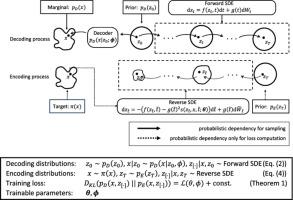基于能量的扩散发生器,用于玻尔兹曼分布的有效采样。
IF 6.3
1区 计算机科学
Q1 COMPUTER SCIENCE, ARTIFICIAL INTELLIGENCE
引用次数: 0
摘要
从玻尔兹曼分布中采样,特别是那些与高维和复杂能量函数相关的分布,在许多领域提出了重大挑战。在这项工作中,我们提出了基于能量的扩散发生器(EDG),这是一种集成了变分自编码器和扩散模型思想的新方法。EDG使用解码器从简单的潜在变量生成玻尔兹曼分布样本,并使用基于扩散的编码器估计目标分布的Kullback-Leibler散度。值得注意的是,EDG是无仿真的,在训练过程中不需要解决普通或随机微分方程。此外,通过消除解码器中的双向性等限制,EDG允许灵活的网络设计。通过实证评估,我们证明了EDG在具有复杂目标分布的各种采样任务中的优越性能,优于现有方法。本文章由计算机程序翻译,如有差异,请以英文原文为准。

Energy-based diffusion generator for efficient sampling of Boltzmann distributions
Sampling from Boltzmann distributions, particularly those tied to high dimensional and complex energy functions, poses a significant challenge in many fields. In this work, we present the Energy-Based Diffusion Generator (EDG), a novel approach that integrates ideas from variational autoencoders and diffusion models. EDG uses a decoder to generate Boltzmann-distributed samples from simple latent variables, and a diffusion-based encoder to estimate the Kullback-Leibler divergence to the target distribution. Notably, EDG is simulation-free, eliminating the need to solve ordinary or stochastic differential equations during training. Furthermore, by removing constraints such as bijectivity in the decoder, EDG allows for flexible network design. Through empirical evaluation, we demonstrate the superior performance of EDG across a variety of sampling tasks with complex target distributions, outperforming existing methods.
求助全文
通过发布文献求助,成功后即可免费获取论文全文。
去求助
来源期刊

Neural Networks
工程技术-计算机:人工智能
CiteScore
13.90
自引率
7.70%
发文量
425
审稿时长
67 days
期刊介绍:
Neural Networks is a platform that aims to foster an international community of scholars and practitioners interested in neural networks, deep learning, and other approaches to artificial intelligence and machine learning. Our journal invites submissions covering various aspects of neural networks research, from computational neuroscience and cognitive modeling to mathematical analyses and engineering applications. By providing a forum for interdisciplinary discussions between biology and technology, we aim to encourage the development of biologically-inspired artificial intelligence.
 求助内容:
求助内容: 应助结果提醒方式:
应助结果提醒方式:


